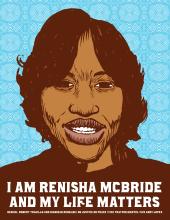black women

I TURN ON THE FAUCET and baptize the collards under ice-cold water for several seconds. I pick the leaves apart with my 12-year-old hands, casting the stems to the side.
A few feet away, my mother reheats her coffee in the microwave and then, between sips, crumbles cornbread and chicken liver into a large, sage-colored bowl. The familiar scent of sweet potato pies dances around the kitchen, along with the unmistakable laughter of my mother on the phone with one of her girlfriends.
Later, I’ll wash and dry the countertop before anointing it with a blanket of white flour in preparation for my mother to make the rolls—my mother’s grandmother’s recipe and the most relished part of the Thanksgiving and Christmas meals. To this day, my mother is one of a few family members who has recorded the secret, something she has always carried with pride.
Some of my first memories about food are stories like this one, at home with my mother conjuring her magic in the kitchen, creating something wonderful out of simple ingredients, as is our legacy as black women. Her food was more than just food; it was nourishment.
Before seminary, before I found language for my womanist theology and politics, before Trayvon Martin and Renisha McBride ushered me into the movement, my hands were actively developing the muscle memory that would later fuel my healing. It took me 15 years to realize that during those times in our kitchen with my mother, I was developing practical tools for my own survival and healing: cutting, peeling, dicing, skinning—not just kitchen duties, but small acts of self-determination.
My addiction to ‘non-food’
I began eating food in secret in high school, mindlessly devouring mini Snickers bars, ice cream, pizza rolls, and French fries in the parking lot at McDonald’s as a way to comfort myself and to avoid what I was truly feeling. When I was stressed or feeling depressed about school or what was going on with my family, I would stuff my face with junk food, making sure to hide the wrappers beneath my mattress.

With the April 23 release of LEMONADE, Beyoncé’s full-length visual album, I am convinced more than ever that “Formation” served as voice crying out on the internet, paving the way for even more conversations about the mistreatment, invisibility, and spiritual essence of black women.

Prosecutors noted a tendency to target women whose credibility would be questioned by both law enforcement and society in general. During the trial, defense attorneys tried to challenge the victims’ credibility by emphasizing their criminal records to the jury and asking about their past drug use. Holtzclaw’s family also accused the victims of fabricating their stories.

In the early morning of Saturday, Nov. 2, Renisha McBride, 19-year-old black woman from Detroit, crashed her car in Dearborn, a predominantly white Detroit suburb. Lacking battery power for her cellphone, she approached a nearby home to ask for help. Theodore Paul Wafer, a white man, answered the door. He responded to her knock by shooting a firearm through a locked screen door, striking Renisha in the face and killing her. Police initially said that the white man mistook her for an intruder and shot her in self-defense, even though Renisha was unarmed and there is no evidence of her attempting to enter the house uninvited. Two weeks passed before the Wafer was charged with second-degree murder and arrested. Wafer maintains that he acted in self-defense. If the recent George Zimmerman acquittal is any indication, it is entirely possible that justice will not come to pass.
A black woman is dead because a white man decided that she should die. A black woman is dead and there is no guarantee, that in 21st-century America, justice will be done.
This is America and this is not new.
I’d never heard of Renisha McBride until her death became a national news story a little more than two weeks ago. But in a way, I’ve known Renisha my whole life. Renisha’s story echoes the stories of black women across the arc of American history.

Evangelicals' Lock On The GOP Cracks; Syria Crisis: Army Steps Up Homs Shelling; Diamond Jubilee: Queen Celebrating 60-Year Reign; Evangelicals And The US Election: A View From The Outside; The New Christian Abolition Movement; Voters Willing To See US Attack Iran Over Nuclear Weapons; For Some Black Women, Economy And Willingness To Aid Family Strains Finances; John McCain Slams Mitt Romney's 'Self-Deportation,' Advocates 'Humane Approach' To Immigration.
The Dream is Freedom: Pauli Murray and American Democratic Faith, by Sarah Azaransky.
One of the big conversations in my household this year has revolved around the question of whether my 9-year-old daughter is ready to get her hair "permed." Some girls at her school have already been initiated into the world of relaxed hair, so the peer pressure is in effect.